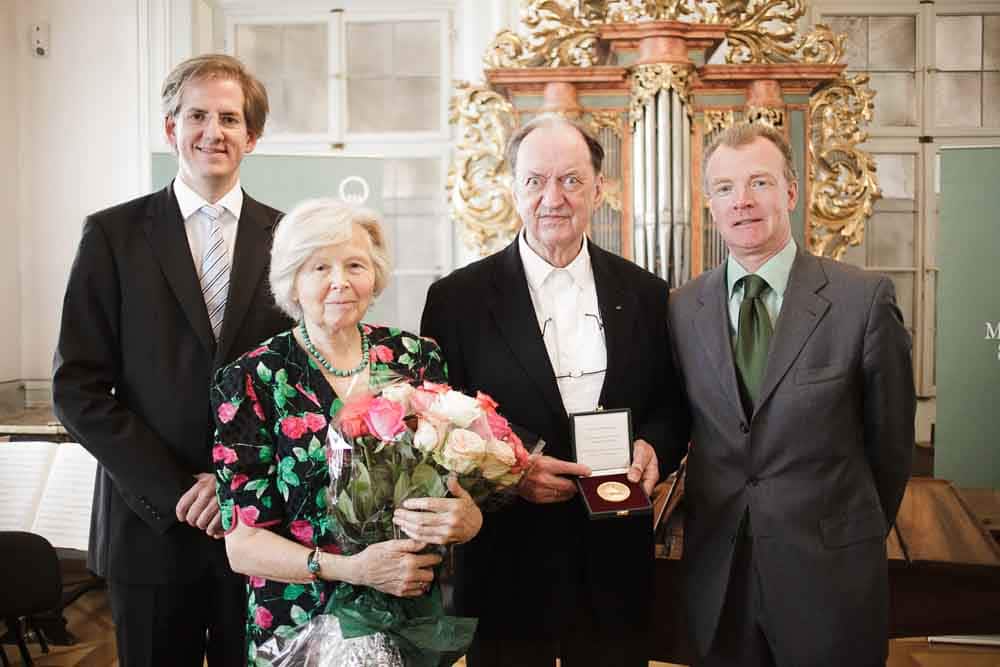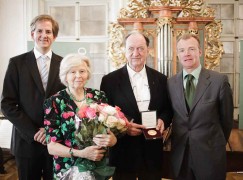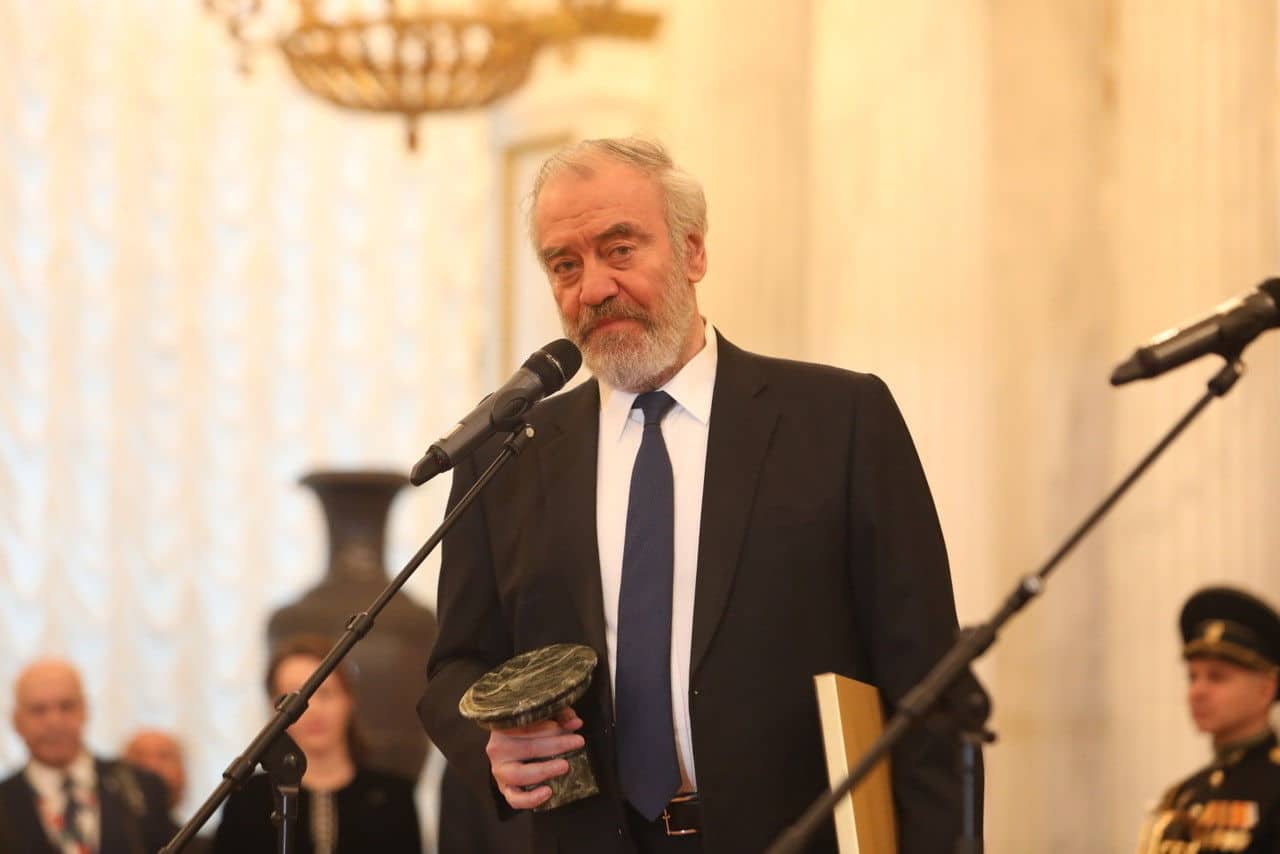Nikolaus Harnoncourt would have been 90 today
mainThe pioneering entrepreneur of period instruments has been gone less than four years and the field has shrunk since his departure.
There are no lions left in early music and the original bands are running out of exposure.
How we miss the plain spoken master of music truths.
‘You realise how few conductors are interested in the music’.

Cherish his memory.






‘No lions’ ?? What about Sir John Eliot Gardiner !!
Was that a rhetorical question, dear professor of zoology?
I would argue, using the same metaphor, that JEG is the King of the Jungle. The reason being is the extraordinary chorus he has trained over many years, The Montiverdi Choir, which in my view is unequaled.
The more interesting question is what will the effect of brexit be on the period ensembles. Many of the players are europeans and play in several of the period groups. Will they have the same flexibility to work freely in and outside the UK without burdensome visa/work permit issues.
Agree about the Monteverdi Choir: the absolute apotheosis of the choir.
Gardiner’s more of an eagle
More like a rooster, I’ve Heard…
A female rooster or a cock?
Female rooster??????
To paraphrase Norma Desmond ,” The music is still big, it is the conductors that have gotten small”
and Norrington?
He was at the Proms a few years ago with the south German orchestra which was amalgamated with another (names forgotten). It was a dreadful reading of Brahms #1.
Lions?
Christie, McCreesh, Herreweghe, Suzuki, Christophers, Alessandrini, Savall.
I was going to say Parrott, but lion doesn’t seem quite right for him. Leopard. Same for van Nevel (for different reasons).
And Robert King, an occasional Slipped Disc commenter, surely deserves at least the title of jaguar or panther.
Dumestre and Pichon are lions-in-waiting.
Peter Phillips (another occasional Slipped Disc commenter), but I don’t think any of the big felids are right for him. For some reason, an owl comes to mind.
Excellent list. I would add René Jacobs and John Butt, and some other kind of big cat for Emmanuelle Haïm. Maybe a leopard like Parrott.
Butt is on his way to lion status; just a matter of time.
Haïm? I think it’s harder for second- and third-generation period practitioners to get lion status because they didn’t break paths in the same way. And Haïm is inconsistent and can sometimes be maddening. (If all of her choices of singer had been as good as Sabine Devieilhe and Lea Desandre on her recent Handel recording, I’d be all in on her.)
Jacobs (besides being, reportedly, a lousy human being) takes way too many liberties with the score — to the point of composing and adding things that the actual composer didn’t put there. (No, I’m not talking about ornamentation.)
Might you add to your list of big names who are still with us Trevor Pinnock? In the late 1970s and early 1980s he and the English Concert radically raised the level of period instrument orchestras in the UK. Setting aside Trevor’s first-rate musicality, his was arguably the first British period instrument orchestra who actually played in tune.
Trevor and DG Archiv brought out some wonderful recordings. Just listen (ideally on your old LPs, which have a sound quality vastly better than the later disappointing transfer to CD) to the last movement of the Bach A major harpsichord concerto from Trevor’s complete Bach harpsichord concertos set. I was so excited by that recording I nearly wore out my LP (and then follow that with the four harpsichord concerto – what a brilliant sound the DG engineers achieved for the original LPs).
Above someone has already mentioned Roger Norrington. Whether people like, or don’t like, his radical ideas on vibrato, he created what were at the time some of the most exciting Beethoven symphonies on period instruments.
Whilst on marmite figures, maybe also consider Ton Koopman? In the 1980s his Amsterdam Baroque Orchestra was pretty good, even if his choice of singers sometimes split the critics (for a good while when the ABO was at the top of the tree, half his instrumentalists were British).
And nowadays we surely should add F-X Roth? Thrilling performances coming from Les Siècles.
I’d have named Pinnock as a lion if he had continued to be as active and visible after he left The English Concert as he was when directing it. But yes, he does deserve some sort of large felid status.
As much difference as he has made, I don’t think Norrington deserves lion status in the early-music revival anymore because he largely left the period-instrument sphere years ago.
Roth, like Butt, will surely deserve lion status eventually, but it’s too soon yet. For now, they can be jaguars or panthers.
Koopman forfeited lion status with things like his really weird-ass reconstruction of the Bach St. Mark Passion. (“Let’s not use the pieces that evidence suggests were obviously part of the piece precisely because the evidence says they were obviously part of the piece!”) And his rebuttal of the Rifkin/Parrott Bach one-singer-per-part thesis in Early Music was, as one prominent figure in this field said to me, “the most embarrassing piece of pseudo-musicology I think I’ve ever seen in English.” I mean, if you really don’t believe the thesis or you simply don’t like the way its results sound, fine, but if you’re going to bother with an evidence-based rebuttal, you have to do better than he did.
Owlish or otherwise, the commenter is a different Peter Phillips.
You’ve never met William Christie?
Giants are few and far between, but let some of the current folks turn 80 and I’m sure they’ll get their due.
The problem on SD with today’s conductors generally seems to be 1) that they’re not dead or 2) they’re not old enough.
I was at his last concert in the Musikverein in May, 2015. He was a wonderful conductor and man.
My (first name) namesake, exactly ten years apart and buried in St. Georgen I.A. He was also a avid climber of the Hochlecken which I climbed as a youth and more recently with my friend Fritz. Rest In Peace, Nikolaus!
Interesting that once they are dead we somehow lionise them!
No, sometimes, it’s just when they get old; they always have to die first.
It is not specific to early music. Where are the lions in the regular classical music field? And Harnoncourt was one in both.
Harnoncourt’s recordings of the Beethoven symphonies with the Chamber Orchestra of Europe are absolutely sublime!!
Harnoncourt was more than just a lion of “early music”.
Although I never had the privilege of hearing him live, his superb recordings of Bartok, Beethoven, Bruckner, Mozart, and Johann Strauss II, among many others, mark him as a master of many eras.
MWnyc has mentioned a number of conductors in his comment of Dec. 6; none of them, I’m sorry to say, are at Harnoncourt’s level.
I have regretted Harnoncourt’s passing mightily over these past four years. He is very much missed.
Norman I’m pleased to see you referenced Harnoncourt this way and didn’t resort to the increasingly horrid and ghoulish “Happy Birthday Maestro X”. I find it bizarre wish Happy Birthday to someone who is no longer living!